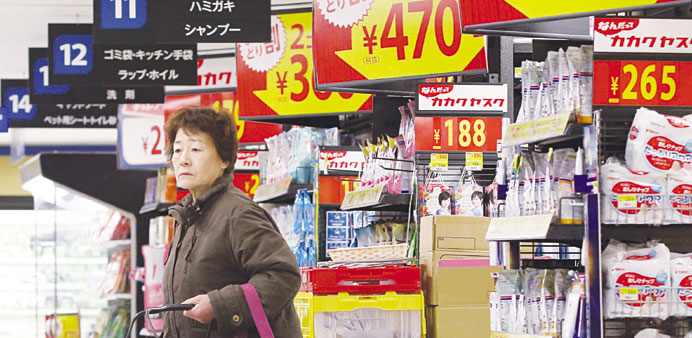Signage displays sale prices as a customer shops at a supermarket in Tokyo. Sales were steady after the tax increase compared with year-earlier levels, according to Reuters survey.
Japanese companies have weathered the first days of a rise in the country’s consumption tax, with sales resilient and pricing power little damaged, a Reuters poll showed yesterday, in an early sign the tax hike will not derail the economy.
This good news for “Abenomics” bolsters the Bank of Japan’s view that it does not need to ease policy further to cushion the impact from the tax, which Prime Minister Shinzo Abe’s government raised on April 1 to help curb the nation’s mountain of public debt.
The increase in the national sales tax to 8% from 5% has sparked worries that consumers will tighten their wallets, threatening the economic recovery Abe has engineered with 16 months of loose monetary policy and government spending.
But about 40% of the firms in the Reuters Corporate Survey, conducted April 2-14, said sales were steady after the tax increase compared with year-earlier levels. And more than a quarter were able to increase sales in the face of the hike.
The longer-term sustainability of sales growth will also depend on wage increases. So far, salary raises at many companies have not been enough to cover the 3-percentage-point tax hike, and the poll shows that some firms remain reluctant to increase wages significantly.
“The transfer of the tax to consumers could be viewed as a positive development, a success for Abenomics, so long as consumers are able to absorb the pain and it doesn’t lead to stalling economic growth,” said Takuji Okubo, chief economist at Japan Macro Advisors, who reviewed the poll results. The survey also showed that nearly half of the roughly 250 respondents, senior managers who are identified only by industry, said they were able to pass on the full cost of the tax increase to customers. A few managed to raise prices more than the scale of the hike.
The monthly survey of companies capitalised at more than 1bn yen ($9.8mn), conducted for Reuters by Nikkei Research, adds to evidence that the sales tax hike will not be as severe as the last increase, in 1997, which ushered in a punishing recession.
“While we estimate a small proportion of consumption to fall, we’re not anticipating an extreme reduction,” said an executive at a chemicals maker. The Reuters Tankan, run in conjunction with the corporate survey, on Thursday showed that manufacturers grew more confident in April for the first time in three months. Confidence at non-manufacturers hit a record.
Also this week, BoJ Governor Haruhiko Kuroda said the impact from the sales tax rise would be short-lived, while Finance Minister Taro Aso said the post-tax-hike downturn in consumption was smaller than he had expected.
Yet while the early signs point to the recovery surviving the tax hike, the survey suggests some companies are still hesitant to raise salaries - despite pleas from Abe for higher wages to help drive a durable expansion and sustain inflation.
Raising wages is a lower priority for manufacturers in the survey than increasing labour productivity, improving workplace conditions for women, expanding overseas operations and postponing retirement, as strategies to combat Japan’s falling labour population.
Last month, some major companies like Toyota Motor Corp offered workers their most generous pay increases in years, but raises at many other firms were not enough to cover the 3-percentage-point increase in the sales tax.
“The real target is to have moderate sustained inflation, stable inflation, and from that perspective, inflation won’t be sustainable unless wages start to rise at the same pace,” Japan Macro’s Okubo said.

